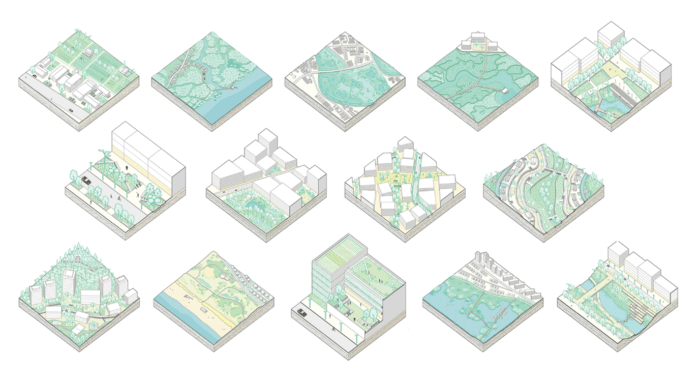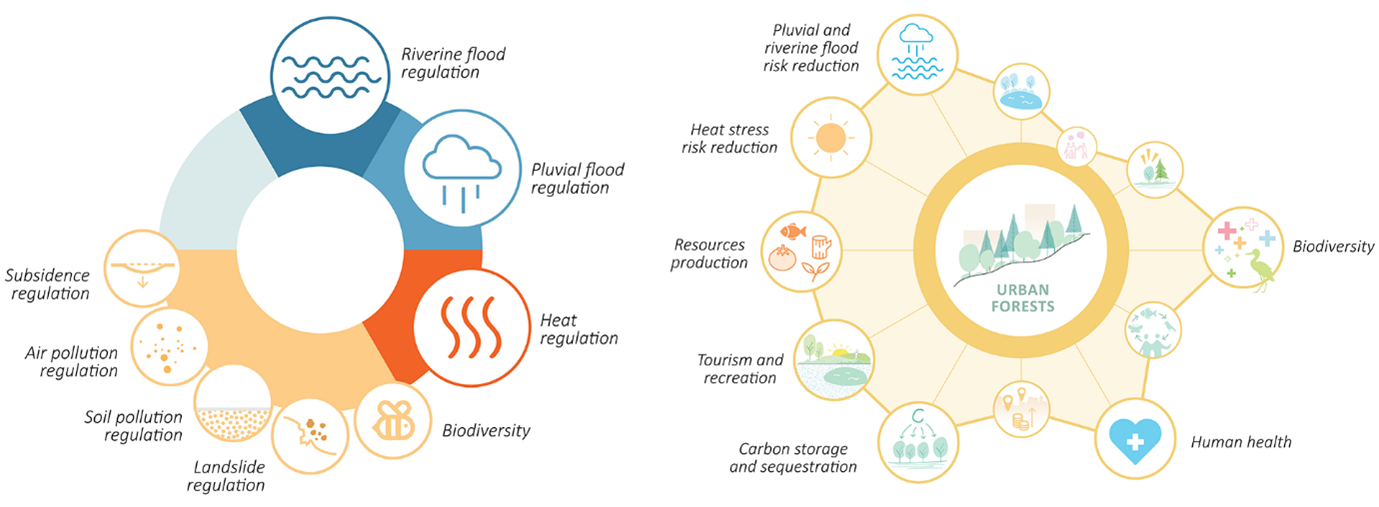Enhancing Urban Resilience with Nature-Based Solutions (NBS)
- Client
- World Bank
- Partners
- World Bank, UNStudio, Rebel and UNSense
- Year
- 2022
Preserving green spaces and biodiversity is crucial for sustaining a healthy and resilient urban environment. Unfortunately, the global increase in urbanization has led to the depletion of these vital elements, making cities more vulnerable to climate change impacts such as floods, heatwaves, and droughts. Nature-Based Solutions (NBS) have emerged as a strategy that leverages natural processes to strengthen urban resilience. Despite the rising demand for NBS, urban planning decision-makers often lack the necessary expertise and knowledge to integrate these solutions effectively.
To address this challenge, Nelen & Schuurmans, in collaboration with the World Bank, Felixx, UNStudio, Rebel, and UNSense, developed the Nature-Based Solutions Catalogue. This comprehensive guide helps stakeholders recognize and implement NBS in urban development projects. NBS offer numerous benefits, including disaster risk reduction, enhanced climate resilience, biodiversity restoration, recreational opportunities, and improved human health.

Image source: https://www.felixx.nl/projects/nbs-catalogue.html
The challenge
Urbanization is a global trend, with over half of the population living in cities. Unfortunately, this shift reduces green spaces and biodiversity. These elements are essential for a healthy and climate-resilient environment. Extreme weather events like floods, heatwaves, and droughts are becoming more frequent and severe. These events pose significant financial risks and threaten overall well-being.
In response, Nature-Based Solutions (NBS) utilize natural processes for urban resilience. NBS provide infrastructure, services, and comprehensive solutions. They offer benefits such as disaster risk mitigation, enhanced climate resilience, and biodiversity restoration. NBS also promote recreational opportunities and improve human health. They ensure water and food security and support community well-being and livelihoods.
Despite growing demand, many urban planners lack knowledge to integrate NBS effectively.
Our solution

The Nature-Based Solutions Catalogue helps integrate these solutions into urban development projects. It was developed with the World Bank, Felixx, UNStudio, Rebel, and UNSense.
Nature-Based Solutions (NBS) can be applied at various scales in and around cities. Locally, NBS might create green spaces on buildings, bioswales, or green corridors along streets and water bodies. City-scale NBS include urban parks and forests. Regionally, they address larger areas like upstream wetlands or coastal natural parks.
The Catalogue of Nature-Based Solutions for Urban Resilience is a comprehensive guide meeting the growing demand for NBS. It assists stakeholders, including policymakers, project developers, urban planners, and engineers, in identifying suitable NBS investments. The Catalogue also aims to initiate policy dialogues on NBS in urban areas. Its practical approach emphasizes applying and implementing NBS families, highlighting the need to move NBS from theory to global practice.
Image source: https://www.felixx.nl/projects/nbs-catalogue.html
The outcome
In terms of outcomes, the suitability of NBS types in a city is influenced to some extent by its location. The catalogue incorporates fourteen distinct NBS categories or families, such as Urban Forests, Terraces and Slopes, River and Stream Renaturation, and others. The Nature-Based Solutions Catalogue from the World Bank serves as a tool for developers to identify and implement sustainable solutions in construction projects. By incorporating NBS, developers can not only reduce the environmental impact of projects but also enhance feasibility through improved property values and reduced operational costs.
All cases